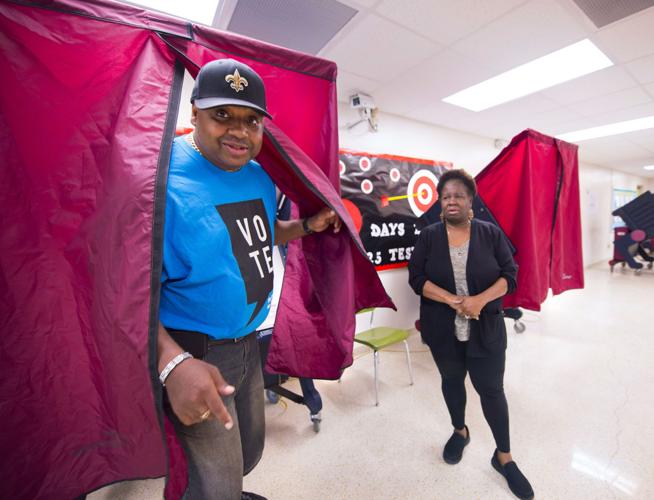For the first time in decades, Baton Rouge resident Ladelle Henderson can walk into a polling precinct and vote for candidates for elected office — and he's ready.
"You've got to vote," he said. "It makes a difference."
The last time Henderson, 48, remembers voting was a presidential election when he voted for Democrat Bill Clinton. He was later convicted of armed robbery in 1993 and sentenced to 25 years in prison. More than a decade after his release, Henderson has only regained his voting rights restored thanks to a new law that took effect March 1.
"It's been too long," Henderson said.
More than 50 people, like Henderson, who were convicted of felonies and remain on probation or parole have sought to have their voting rights reinstated in the first three weeks of the new law. It’s possible that more felons have registered to vote for the first time under to the new law, but Secretary of State Kyle Ardoin said his office doesn’t distinguish between felons registering for the first time and nonfelons who are newly registering. In the first three weeks of March, there were a total of 153 new voter registrations.
“There’s no doubt that I had concerns as it was going through the process, but as secretary I’m committed to implementing the laws that the Legislature passes,” said Ardoin, a Republican who is seeking election to his first full term this year. “It’s gone very smoothly."
Some 36,000 felons who haven't been in prison for at least the last five years will have the opportunity to register to vote when a new law ta…
Some 36,000 felons who haven't been in prison for at least the last five years can now register to vote under the law the Louisiana Legislature narrowly passed after multiple attempts last year.
Ardoin and the Department of Public Safety and Corrections worked together to hammer out a multistep process for how the new law would be implemented.
It begins with felons obtaining a form from their probation or parole officers' that they must deliver to local registrars of voters.
“Our probation and parole staff is well versed in what’s going on,” said DOC spokesman Ken Pastorick. “They’ve done a tremendous job in helping the folks that are qualified with working through the process.”
“You would have to believe when there is a bigger election ahead you would see more folks come in and register," Pastorick said. "I’m sure we haven’t seen the full scope of the people coming in to see if they are qualified and if they are registering to vote.”
The bill's unlikely passage didn't come easy. It was rejected twice in the GOP-controlled House earlier in the same session, before it passed on its third attempt. Due to a technical change, it had to win the majority of the House’s approval a second time as lawmakers were preparing to end the session early.
“Anyone that was at the statehouse last year knows that it was kind of a roller coaster,” said Bruce Reilly, deputy director of Voice of the Experienced, or VOTE, a group that advocates on behalf of formerly incarcerated people.
Kyle Ardoin, the bureaucratic caretaker who initially wasn’t going to run for the office, was elected Saturday night as Louisiana’s Secretary …
The state Constitution prohibits people “under an order of imprisonment” on a felony conviction from voting. A 1976 law expanded that to people convicted of felonies and still on probation or parole.
That law was already facing a challenge in court before the Legislature acted on the bill sponsored by Rep. Pat Smith, D-Baton Rouge.
More than 70,000 Louisiana residents are on probation or parole for felony crimes.
Details about navigating the new law don't appear on the Secretary of State website's homepage — a result of prioritizing special elections and other important elections information, Ardoin said.
VOTE has been working to educate those affected by the new law, putting posters in probation and parole offices and distributing fliers for people to share.
“It’s interesting that so much of the explanatory burden is falling on an organization that was founded in Angola and run by formerly incarcerated persons,” Reilly said. “We’re doing our best to reach people in a lot of different ways.”
The people affected range from those who served their sentences and value civic engagement, but will likely spend the rest of their lives on probation to younger probationers in a demographic already less inclined to vote.
“Unfortunately, there are plenty of people who do not want everyone participating in democracy, and that’s often what we are up against,” Reilly said.
Legislation has been prefiled for the session that starts April 8 to streamline some of the registration process and make clarifications to how the law is to operate.
“As with anything, the first time you do it, you don’t necessarily have all the kinks worked out,” said Reilly.
Reilly said it’s important that the process not be too onerous to navigate.
“Historically, when you start throwing up barriers and delays in the process, it turns people away,” he said.
Advocate reporter Grace Toohey contributed to this report.







